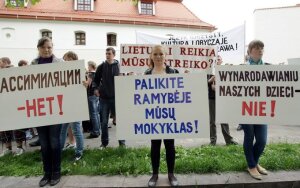- February 12, 2013
- 389
The Ministry of Education will prove the privileges for students from national minorities schools. The comments of Kwiatkowski, Pavalkis and Stepanovicius

After the meeting of The Political Council of the Lithuanian ruling coalition which took place yesterday, the Ministry of Education proclaimed that the students from a non-Lithuanian schools would have some additional privileges while writing an essay on A-level exam from the national language.
All students, from both Lithuanian schools and the national minorities schools when writing an essay could choose out of seven and not out of three authors as it was planned.
The students from national minorities schools would also have to write shorter essay than their friends from Lithuanian schools: on a state exam this writing should have approximately 400 to 500 words but on a school exam it is from 250 to 350 words.
The students from a non-Lithuanian schools could also make more mistakes and, what is more, they could also use an dictionary.
Kwiatkowski: It is good in a bad situation
The Member of Parliament and the President of the Polish Educational Society in Lithuania Józef Kowalski claims that is a good step ahead because these changes were requested for two years. In the future, the Polish Educational Society and the Electoral Action of Poles in Lithuania would like to withdraw this amendment. “It is good in a bad situation, we did not have any other choices. The privileges have been increased” – said PL DELFI Józef Kwiatkowski.
Kwiatkowski emphasized that in this case we can talk about the increasing of the students’ chances from Polish schools, not about making the chances equal. In MP’s opinion, from his experience he can see that a person for which that language is their national one will have more chances to pass the exam than a person for which it is a second language, the language that he learns.
The privileges will be only for one year
The Minister of Education Dainius Pavalkis agrees with the statement that the introduction of these privileges on an A-level exam from national language for students from national minorities schools would influence on the quality of this exam. However, she does not see any problems in it. “I think that the Government should seek a compromise between what they want to do and what others want to do. I think that we reached such a compromise which would also improve conditions for Lithuanian schools. Our biggest concern is whether that affects the quality of the exam. Nevertheless, in my opinion, the privileges for one year, especially for a new exam, will not cause any tragedy” – the Minister said in an interview for LRT.
That privileges would be valid only for one year. “Yesterday the conversation concerned about the fact that we guarantee the privileges for one year. Later on, we would see how the situation looks like. If we discern that the students from the national minorities schools are able to write more difficult exam, then we certainly will not use these privileges” – explained the Minister.
According to her opinion the most important is that all the students should pass the same exam from Lithuanian.
Steponavičius: This is actually the abandonment of standardized test
Gintaras Steponavičius – the previous Minister of Education and now the Member of Parliament from the Liberal Movement – believes that these privileges mean the withdrawal of an standardized exam. “I think it is highly irresponsible and unprofessional political movements which are not argued by any researches or expert analysis. In general, the introduction of a smaller amount of the words in an essays for the students of the schools of national minorities means giving up of the standardized form of an exam this year “- said the previous Minister to BNS.
Tłumaczenie Diana Omiljaniuk w ramach praktyk w Europejskiej Fundacji Praw Człowieka, www.efhr.eu. Translated by Diana Omiljaniuk the framework of a traineeship programme of the European Foundation of Human Rights, www.efhr.eu.

